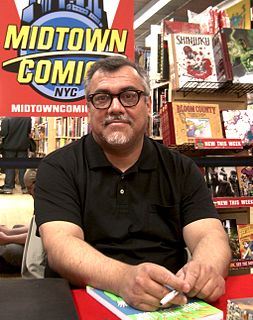A Quote by Trina Robbins
I saw the comics in the East Village Other, and they weren't superhero comics, they were all about hippies and all about things hippies were interested in. And there was one page in particular, a full page strip called "Gentle's Trip Out" signed "Panzika", and it was totally, totally psychedelic, and really, I don't know if it made any sense at all but it looked so great, and I thought, "This is what I want to do, this is my big influence," and it was.
Related Quotes
I started drawing comics, and at first I was very influenced by the whole pop art movement, you know, Batman was on TV and all that pop art stuff? But then my next influence was in 1966, or maybe it was '65, I don't know. Somebody showed me a copy of the "East Village Other", which was an underground newspaper. And... it had comics in it! And they weren't superhero comics.
Comics are not theatre - there's a very important difference in that the reader controls the page. You can linger on a page of comics as long as you want. You can read and go forward and then move back; you can reread, in one sitting or at your leisure. You can take as much time as you want to take in that story.
When I was a kid, back in the '40s, I was a voracious comic book reader. And at that time, there was a lot of patriotism in the comics. They were called things like 'All-American Comics' or 'Star-Spangled Comics' or things like that. I decided to do a logo that was a parody of those comics, with 'American' as the first word.
I was going to be a storybook illustrator or an editorial illustrator. I ended up in a comics class by mistake because all the others were full, so I was like 'I'll stay for one class, and then I'll go take something else, because I don't care about comics.' I got pulled in really fast; I discovered I had a voice in comics that I didn't know I had.
The hippies had in mind something that they wanted, and were calling it freedom, but in the final analysis freedom is a purely negative goal. It just says something is bad. Hippies weren't really offering any alternatives other than colorful short-term ones, and some of these were looking more and more like pure degeneracy. Degeneracy can be fun but it's hard to keep up as a serious lifetime occupation.
My feeling is that it's one of the very few things that comics can do that you really can't do in any other medium. I feel like the reader accepts all of these styles, and after a certain point you can flip the pages and see a character rendered very differently than you saw on an earlier page, and it's not jarring. It suggests things that you can't suggest just in the writing or in the plotting.






































